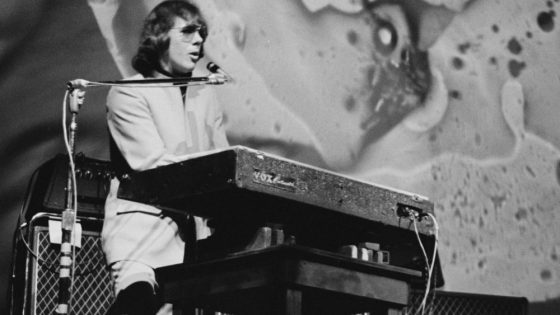Doug Ingle, who co-founded the heavy rock band Iron Butterfly and was the singer and organist on songs including their signature hit, “In-a-Gadda-Da-Vida,” died Friday at age 78. He was the last surviving member of the classic lineup from the late 1960s.
Most of Iron Butterfly’s success came with the 17-minute FM radio smash “In-a-Gadda-Da-Vida.” The 1968 sophomore album named after the hit single spent 81 weeks in the top 10 in the U.S.; for a while it stood as the bestselling album in Atlantic Records’ history. The LP went on to be certified quadruple-platinum.
Ingle’s family announced the passing on social media and did not give a cause of death. “It’s with a heavy heart & great sadness to announce the passing of my Father Doug Ingle,” posted Doug Ingle Jr. “Dad passed away peacefully this evening in the presence of family. Thank You Dad for being a father, teacher and friend. Cherished loving memories I will carry the rest of my days moving forward in this journey of life. Love you Dad.”
Ingle was the last surviving member of the original lineup, which was formed in San Diego in 1966, and also the only survivor of the so-called classic edition of the group that recorded “In-A-Gadda-Da-Vida” two years later, at which point the band had undergone a total turnover except for him.
An edit of “In-a-Gadda-Da-Vida” that lasted only two minutes and 52 seconds went up the charts to land at No. 30 on the Billboard Hot 100, although that is little indication of just how thoroughly the song infiltrated the culture. It was the 17-minute album track that became legendary — and something of an affectionate running joke in rock circles, as either a symbol of excessive length or just something a late-night FM disc jockey could put a needle down on for a smoking or bathroom break.
Beyond the epic length, the biggest piece of lore surrounding the song had to do with its willfully silly title, which was basically a slurred version of “in the garden of eden,” as allegedly misheard by drummer Ron Bushy when Ingle was first presenting the song to the band.
On a 1995 episode of “The Simpsons,” “Bart Sells His Soul,” Bart snuck a version of the organ-driven song into his church’s worship service under the de-slurred title “In the Garden of Eden,” credited to I. Ron Butterfly. “Hey, Marge, remember when we used to make out to this hymn?” whispered Homer.
Besides being covered by Bart Simpson’s church congregation, “In-A-Gadda-Da-Vida” was covered by Slayer (on the soundtrack for the film “Less Than Zero”), the Residents, Boney M and the Incredible Bongo Band, whose version was twice-sampled by the rapper Nas. It also appeared memorably in Michael Mann’s thriller “Manhunter.”
Part of the reason the track ended up being 17 minutes long is that, when Iron Butterly arrived at the recording studio, engineer Don Casale asked the group to play through the song so he could set his levels. They jammed through the extended version heard on LP as a practice run, unaware that Casale had hit “record”; that epic jam, of course, ended up being the master take.
Iron Butterfly has not remained as ubiquitous a name in counterculture nostalgia as other groups of its era have, partly because the group broke up rather soon after its biggest successes — in 1971 — and did not enjoy the extended reunions that some others did.
But Ingle did take part in a short reunion in the late ’70s, two more in the 1980s and, finally, a longer stint in the late 1990s, which ended when Ingle retired from performing altogether in 1999.
Among the other band members from the classic “In-A-Gadda-Da-Vida” era of the band, guitarist Erik Brann died in 2003, bassist Lee Dornan in 2012 and drummer Ron Bushy in 2021.
A Wikipedia entry for the group lists 60 musicians who have been part of the group in its various incarnations over the decades — on top of the four musicians who tour as Iron Butterfly today, none of whom go further back with the band than 1995.
In an interview with the Los Angeles Times in 1995, when the group was beginning a reunion tour, Ingle talked about his regrets about how things had gone down with the group in the ’70s, with plenty of problems brought about by debt.
“It all came so fast and easy,” Ingle told the Times, describing how he had become a multi-millionaire in his early 20s, then got hit hard by unpaid tax debt and lost a 600-acre ranch, apartment building and even his grand piano, before he resolved his tax problems in 1986.
“I was a child among men,” said Ingle, looking back at 48. “I was dealing with people who were competent but not necessarily (working) in my interest. I took the luxury of playing ostrich. I didn’t involve myself at the business level at all. I just went out and performed. It was, ‘Isn’t life great?’ Then everything crashed down. I still maintain life is great, but now I base it on something (real) rather than wishful thinking.”
Source Agencies




